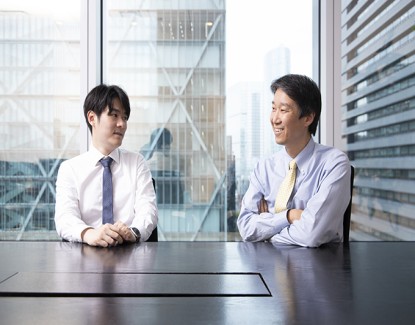Market Commentary and Fund Performance
Masa Takeda of Tokyo-based SPARX Asset Management Co., Ltd., sub-advisor to the Hennessy Japan Fund, shares his insights on the market and Fund performance.
-
 Masakazu Takeda, CFA, CMAPortfolio Manager
Masakazu Takeda, CFA, CMAPortfolio Manager
Fund Performance Review
For the month of January, the Hennessy Japan Fund (HJPIX) returned -1.81%, underperforming the Russell Nomura Total Market™ Index which returned -0.68%. The Tokyo Stock Price Index (TOPIX) returned -1.16% for the same period. Among the best performers were our investments in Nidec Corporation, the world’s leading comprehensive motor manufacturer, Mercari,Inc., a leading flea market application service provider, and Recruit Holdings Co., Ltd., Japan’s unique print & online media giant specializing in classified ads.
Click here for full, standardized Fund performance.
As for the laggards, Olympus Corporation, a leading company in the medical field, including gastrointestinal endoscopy which has a 70% share of the world market; Terumo Corporation, Japan’s largest medical device manufacturer; and Daikin Industries, Ltd., the leading global manufacturer of commercial-use air conditioners detracted from the Fund’s performance.
Our Focus on ESG
Our investment mantra, “Invest in a great business with exceptional management at an attractive price,” calls for great companies not just in a financial sense but also in Environmental, Social, and Governance (ESG) terms. Indeed, ESG has been the most noticeable movement in the asset management industry for quite some time, and rightly so. While non-ESG compliant companies might do financially better at present as they are not shackled by external constraints, sooner or later more public scrutiny and greater regulatory penalties will catch up to them, undermining their financial performance in the end. Pursuing sustainable growth through an ESG framework essentially means delayed gratification, which also happens to be what investing is all about (i.e., the act of forgoing the immediate pleasures of spending money now to get more money in the future.)
We have been committed to investing responsibly for many years. SPARX Asset Management has been a signatory of the Japan Stewardship Code since 2014, laying out our stewardship responsibilities towards our investee companies. SPARX Group, our parent company, has been a signatory of the United Nations Principles for Responsible Investment (UN PRI) since February 2018. In January 2020, we also formally expressed support for the Task Force on Climate-related Financial Disclosures (TCFD).
At SPARX, we utilize ESG data and Carbon Emission Data from third party vendors Sustainalytics and S&P Trucost, respectively, in helping to make our assessment of our investees, alongside financial performance metrics.
As we all know, the ESG framework consists of three evaluation areas: Environment, Social, and Governance. Of these, “E” is probably the easiest to assess during the course of company research because most of the information you need is publicly disclosed. Companies’ annual reports provide a basic overview of business activities. Thanks to the companies’ reports, those that lead to large-scale carbon emissions, ocean pollution, or deforestation can be eliminated. Hazardous consumer products like tobacco and alcoholic drinks, or manufacturing of weaponry can be ruled out as well.
Currently, most, if not all, of the Fund holdings are not engaged in the aforementioned activities in any major way as the majority of these businesses are excluded from the universe to start with. We aim to invest in companies characterized by high returns on capital, which tend to be asset-light by nature. As such, they inherently exist outside of potentially environmentally detrimental industries.
When assessing “S,” we find it straightforward to reach a conclusion although gathering information requires some investigative work. For instance, the use of child labor, employee harassment, abusing of the suppliers, and social conflicts with local communities are often uncovered by investigative journalists first. When such news breaks out, institutional investors move to “dump” the shares to stay compliant with the ESG requirements. However, removing a scandal-hit company from the portfolio only after negative publicity has come to light does not seem to be an optimal approach. Rather, we should do our best to ensure the portfolio steers clear of such potential pitfalls to the extent possible. Our conduct-based screens are very helpful here to filter controversial companies from the universe. From a bottom-up perspective, this is why it is prudent to focus on well-established companies whose long track records have not been blemished with any social issues in the past rather than newly created companies with short operating history.
Assessing "G" is a little trickier. To ensure a company's governance has effective checks and balances so that risks of future scandals or managerial missteps can be mitigated, best practice calls for gender diversity, racial diversity of board members, proper owner/manager separation, elaborate financial/non-financial disclosure policy and so on. However, these are just a means to an end. Just because a company has a gender-biased board doesn’t mean the directors always end up making sub-optimal decisions or acting in bad faith. For example, a male-dominant board (or a female-dominant board) may be a sheer result of selecting the best talents for the role. If you had a choice between highly skilled, business savvy, passionate male candidate versus a female candidate who is less competent, not as passionate, and not so shareholder-oriented, which one should be chosen for the good of the company? We believe substance should take precedence over style, not the other way around.
Lastly, the Fund’s holdings are a true testament to the impact we are making in sustainable investing. For investors looking to proactively contribute to environmental causes through the Fund, we can proudly say that Nidec, the Fund’s largest holding, is the world’s largest producer of brushless direct current (DC) motors, which are known for their superior power efficiency compared to the traditional brushed type. Capitalizing on this know-how, the company has been putting significant resources into the electric vehicle (EV) traction motors business in recent years. It has become clear that EVs will play a big part in replacing gasoline-based cars to reduce carbon emissions over the next several decades, and Nidec will be at the forefront of this trend. Daikin’s air conditioners are well-known for high energy efficiency. The world is faced with dual tasks of curbing greenhouse gases and keeping mankind cool during the brutal summer heat, which happens more frequently nowadays as a result of the global warming phenomenon. Daikin air conditioning (AC) systems are one solution. Shimano is a global bicycle components manufacturer. The bicycle is the ultimate environmentally friendly mode of transportation. We believe the more the company thrives, the more carbon-free the world will become. Elsewhere, Sony regularly ranks highly on board diversity. For example, according to Top 100 Diversity and Inclusion Companies compiled by the financial data service provider Refinitiv, the company came in 13th in 2020, the highest among Japanese companies. Kao, the maker of household products, has been selected for inclusion in the “World’s Most Ethical Companies” list by U.S. think-tank Ethisphere for 14 years running, the only Japanese company with this honor. These are just some examples of the very high-quality of the companies in the Fund.
Click here for a full listing of Holdings.
- In this article:
- Japan
- Japan Fund
You might also like
-
 Portfolio Perspective
Portfolio Perspective
Japan Small Cap FundA Focus on Japanese Small-Caps Making Big Corporate Improvements
 Takenari Okumura, CMAPortfolio Manager
Takenari Okumura, CMAPortfolio Manager Tadahiro Fujimura, CFA, CMAPortfolio ManagerRead the Commentary
Tadahiro Fujimura, CFA, CMAPortfolio ManagerRead the CommentaryThe Portfolio Managers discuss their view of the Japanese small-cap corporate landscape amid many shifting factors, including a new Prime Minister, finalized tariff situation, currency volatility, and attractive valuation environment.
-
 Portfolio Perspective
Portfolio Perspective
Japan FundCompelling Japanese Opportunities Amid Attractive Valuations
 Masakazu Takeda, CFA, CMAPortfolio Manager
Masakazu Takeda, CFA, CMAPortfolio Manager Angus Lee, CFAPortfolio ManagerRead the Commentary
Angus Lee, CFAPortfolio ManagerRead the CommentaryThe Hennessy Japan Fund Portfolio Managers highlight the effect of the new Prime Minister on the economy and market and how holdings were affected by the final trade agreement. They also discuss currency volatility, valuations, and the most compelling opportunities as we end 2025.
-
 Investment Idea
Investment IdeaCompelling Valuations in Japan
 Masakazu Takeda, CFA, CMAPortfolio Manager
Masakazu Takeda, CFA, CMAPortfolio Manager Angus Lee, CFAPortfolio Manager
Angus Lee, CFAPortfolio Manager Tadahiro Fujimura, CFA, CMAPortfolio Manager
Tadahiro Fujimura, CFA, CMAPortfolio Manager Takenari Okumura, CMAPortfolio ManagerRead the Investment Idea
Takenari Okumura, CMAPortfolio ManagerRead the Investment IdeaJapanese equities are currently trading at compelling valuation levels compared to other developed equity markets around the world and relative to their own historical averages. We believe the Japanese market deserves a closer look.
